Project Management: Characteristics, Frameworks, and Team Management
VerifiedAdded on 2020/10/22
|14
|3802
|193
Project
AI Summary
This project management assignment analyzes Balfour Beatty's office relocation project, covering various aspects of project management. The assignment begins with an introduction to project management, then delves into the project's background, purpose, objectives, scope, deliverables, constraints, and assumptions. It then explores the characteristics of a project and the role of a project manager, including planning, risk analysis, and progress monitoring. The assignment also examines the application of theoretical frameworks and methodologies, particularly the Critical Path Method (CPM), within a project environment. Furthermore, it discusses team composition and management, emphasizing the importance of expertise and trust. The assignment concludes with a project management plan, covering cost, schedule, quality, risk, and configuration management, along with a discussion of project success and failure factors. The document provides a comprehensive overview of project management principles and their application in a real-world scenario.

Project management
Paraphrase This Document
Need a fresh take? Get an instant paraphrase of this document with our AI Paraphraser

Table of Contents
INTRODUCTION...........................................................................................................................1
MIN BODY.....................................................................................................................................1
CONCLUSION.............................................................................................................................11
REFERENCES................................................................................................................................1
INTRODUCTION...........................................................................................................................1
MIN BODY.....................................................................................................................................1
CONCLUSION.............................................................................................................................11
REFERENCES................................................................................................................................1
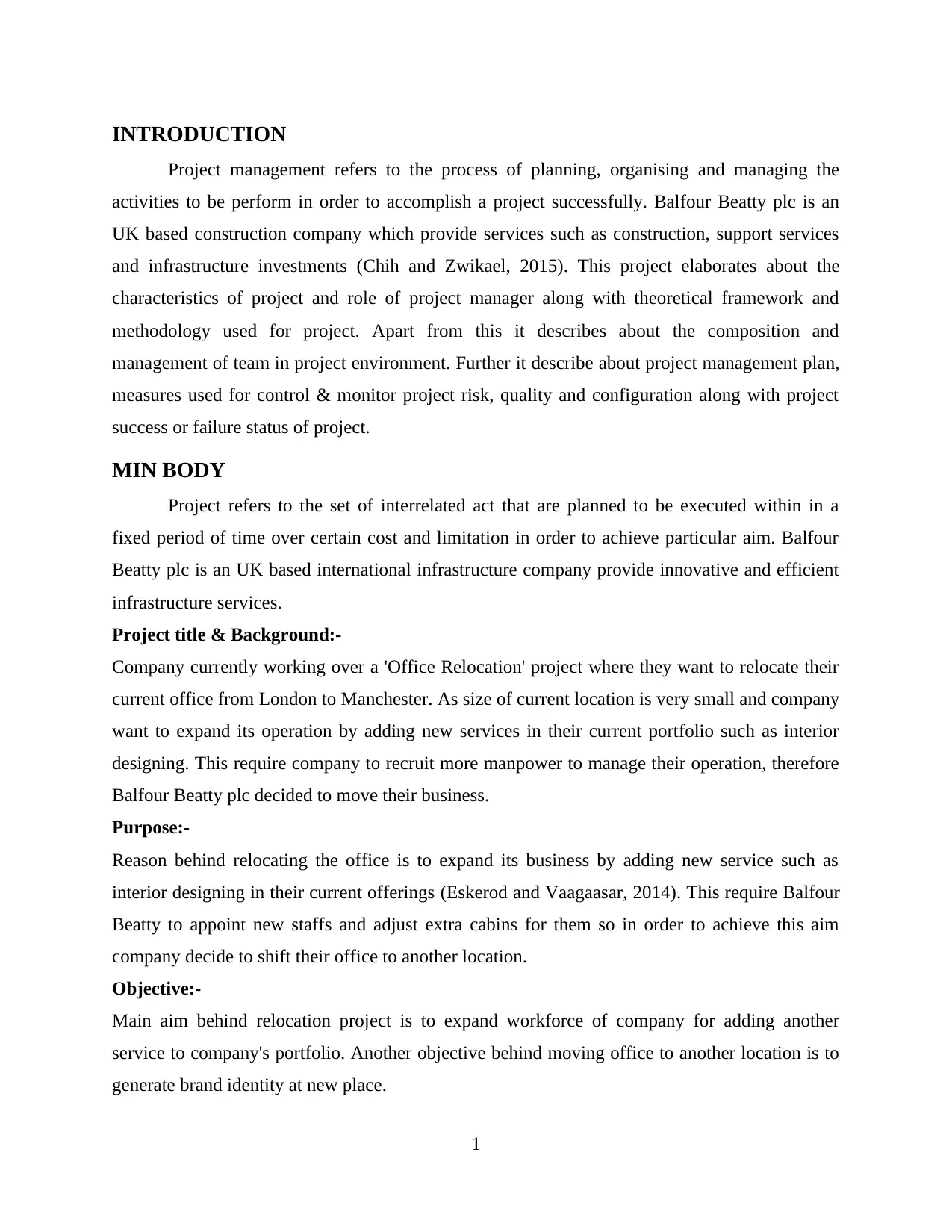
INTRODUCTION
Project management refers to the process of planning, organising and managing the
activities to be perform in order to accomplish a project successfully. Balfour Beatty plc is an
UK based construction company which provide services such as construction, support services
and infrastructure investments (Chih and Zwikael, 2015). This project elaborates about the
characteristics of project and role of project manager along with theoretical framework and
methodology used for project. Apart from this it describes about the composition and
management of team in project environment. Further it describe about project management plan,
measures used for control & monitor project risk, quality and configuration along with project
success or failure status of project.
MIN BODY
Project refers to the set of interrelated act that are planned to be executed within in a
fixed period of time over certain cost and limitation in order to achieve particular aim. Balfour
Beatty plc is an UK based international infrastructure company provide innovative and efficient
infrastructure services.
Project title & Background:-
Company currently working over a 'Office Relocation' project where they want to relocate their
current office from London to Manchester. As size of current location is very small and company
want to expand its operation by adding new services in their current portfolio such as interior
designing. This require company to recruit more manpower to manage their operation, therefore
Balfour Beatty plc decided to move their business.
Purpose:-
Reason behind relocating the office is to expand its business by adding new service such as
interior designing in their current offerings (Eskerod and Vaagaasar, 2014). This require Balfour
Beatty to appoint new staffs and adjust extra cabins for them so in order to achieve this aim
company decide to shift their office to another location.
Objective:-
Main aim behind relocation project is to expand workforce of company for adding another
service to company's portfolio. Another objective behind moving office to another location is to
generate brand identity at new place.
1
Project management refers to the process of planning, organising and managing the
activities to be perform in order to accomplish a project successfully. Balfour Beatty plc is an
UK based construction company which provide services such as construction, support services
and infrastructure investments (Chih and Zwikael, 2015). This project elaborates about the
characteristics of project and role of project manager along with theoretical framework and
methodology used for project. Apart from this it describes about the composition and
management of team in project environment. Further it describe about project management plan,
measures used for control & monitor project risk, quality and configuration along with project
success or failure status of project.
MIN BODY
Project refers to the set of interrelated act that are planned to be executed within in a
fixed period of time over certain cost and limitation in order to achieve particular aim. Balfour
Beatty plc is an UK based international infrastructure company provide innovative and efficient
infrastructure services.
Project title & Background:-
Company currently working over a 'Office Relocation' project where they want to relocate their
current office from London to Manchester. As size of current location is very small and company
want to expand its operation by adding new services in their current portfolio such as interior
designing. This require company to recruit more manpower to manage their operation, therefore
Balfour Beatty plc decided to move their business.
Purpose:-
Reason behind relocating the office is to expand its business by adding new service such as
interior designing in their current offerings (Eskerod and Vaagaasar, 2014). This require Balfour
Beatty to appoint new staffs and adjust extra cabins for them so in order to achieve this aim
company decide to shift their office to another location.
Objective:-
Main aim behind relocation project is to expand workforce of company for adding another
service to company's portfolio. Another objective behind moving office to another location is to
generate brand identity at new place.
1
⊘ This is a preview!⊘
Do you want full access?
Subscribe today to unlock all pages.

Trusted by 1+ million students worldwide
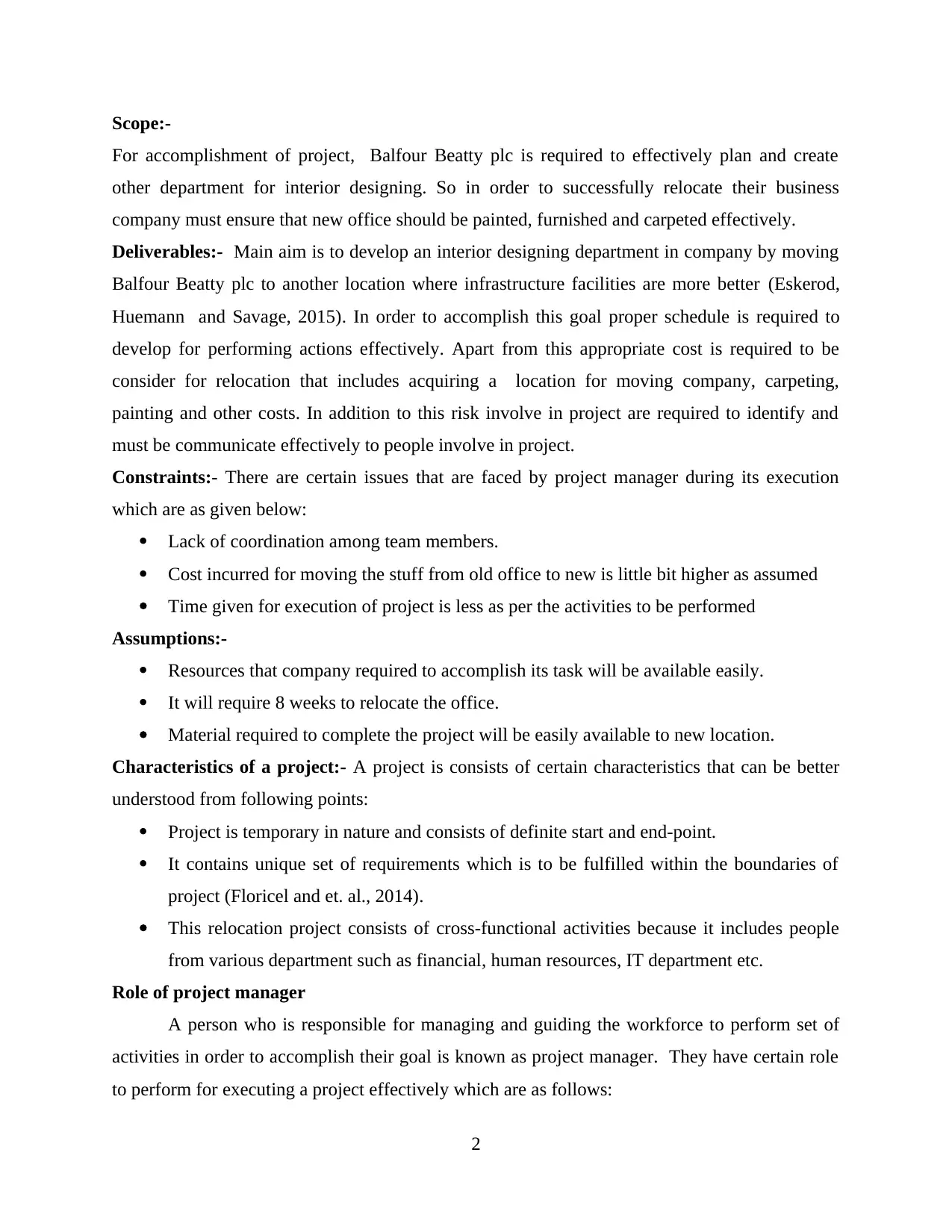
Scope:-
For accomplishment of project, Balfour Beatty plc is required to effectively plan and create
other department for interior designing. So in order to successfully relocate their business
company must ensure that new office should be painted, furnished and carpeted effectively.
Deliverables:- Main aim is to develop an interior designing department in company by moving
Balfour Beatty plc to another location where infrastructure facilities are more better (Eskerod,
Huemann and Savage, 2015). In order to accomplish this goal proper schedule is required to
develop for performing actions effectively. Apart from this appropriate cost is required to be
consider for relocation that includes acquiring a location for moving company, carpeting,
painting and other costs. In addition to this risk involve in project are required to identify and
must be communicate effectively to people involve in project.
Constraints:- There are certain issues that are faced by project manager during its execution
which are as given below:
Lack of coordination among team members.
Cost incurred for moving the stuff from old office to new is little bit higher as assumed
Time given for execution of project is less as per the activities to be performed
Assumptions:-
Resources that company required to accomplish its task will be available easily.
It will require 8 weeks to relocate the office.
Material required to complete the project will be easily available to new location.
Characteristics of a project:- A project is consists of certain characteristics that can be better
understood from following points:
Project is temporary in nature and consists of definite start and end-point.
It contains unique set of requirements which is to be fulfilled within the boundaries of
project (Floricel and et. al., 2014).
This relocation project consists of cross-functional activities because it includes people
from various department such as financial, human resources, IT department etc.
Role of project manager
A person who is responsible for managing and guiding the workforce to perform set of
activities in order to accomplish their goal is known as project manager. They have certain role
to perform for executing a project effectively which are as follows:
2
For accomplishment of project, Balfour Beatty plc is required to effectively plan and create
other department for interior designing. So in order to successfully relocate their business
company must ensure that new office should be painted, furnished and carpeted effectively.
Deliverables:- Main aim is to develop an interior designing department in company by moving
Balfour Beatty plc to another location where infrastructure facilities are more better (Eskerod,
Huemann and Savage, 2015). In order to accomplish this goal proper schedule is required to
develop for performing actions effectively. Apart from this appropriate cost is required to be
consider for relocation that includes acquiring a location for moving company, carpeting,
painting and other costs. In addition to this risk involve in project are required to identify and
must be communicate effectively to people involve in project.
Constraints:- There are certain issues that are faced by project manager during its execution
which are as given below:
Lack of coordination among team members.
Cost incurred for moving the stuff from old office to new is little bit higher as assumed
Time given for execution of project is less as per the activities to be performed
Assumptions:-
Resources that company required to accomplish its task will be available easily.
It will require 8 weeks to relocate the office.
Material required to complete the project will be easily available to new location.
Characteristics of a project:- A project is consists of certain characteristics that can be better
understood from following points:
Project is temporary in nature and consists of definite start and end-point.
It contains unique set of requirements which is to be fulfilled within the boundaries of
project (Floricel and et. al., 2014).
This relocation project consists of cross-functional activities because it includes people
from various department such as financial, human resources, IT department etc.
Role of project manager
A person who is responsible for managing and guiding the workforce to perform set of
activities in order to accomplish their goal is known as project manager. They have certain role
to perform for executing a project effectively which are as follows:
2
Paraphrase This Document
Need a fresh take? Get an instant paraphrase of this document with our AI Paraphraser
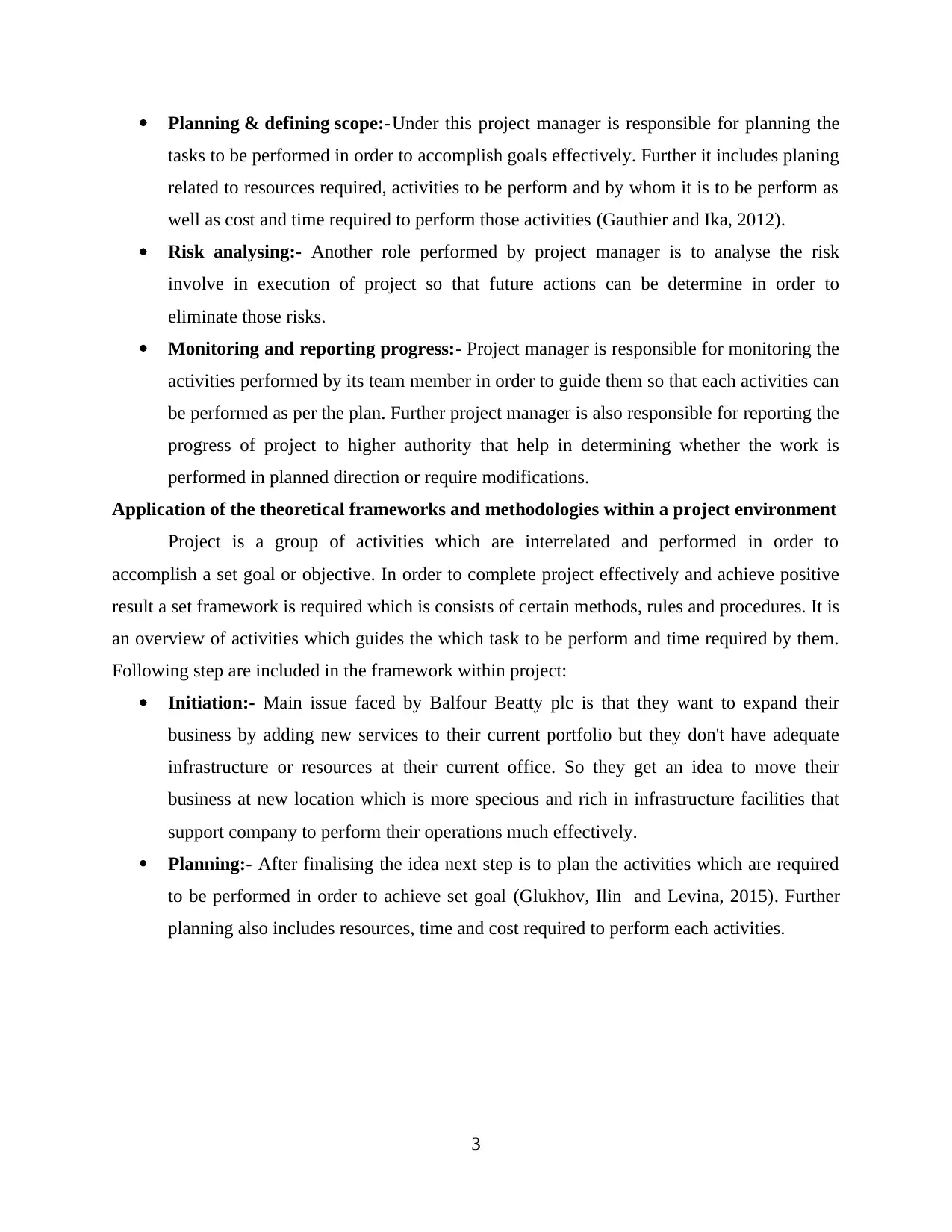
Planning & defining scope:-Under this project manager is responsible for planning the
tasks to be performed in order to accomplish goals effectively. Further it includes planing
related to resources required, activities to be perform and by whom it is to be perform as
well as cost and time required to perform those activities (Gauthier and Ika, 2012).
Risk analysing:- Another role performed by project manager is to analyse the risk
involve in execution of project so that future actions can be determine in order to
eliminate those risks.
Monitoring and reporting progress:- Project manager is responsible for monitoring the
activities performed by its team member in order to guide them so that each activities can
be performed as per the plan. Further project manager is also responsible for reporting the
progress of project to higher authority that help in determining whether the work is
performed in planned direction or require modifications.
Application of the theoretical frameworks and methodologies within a project environment
Project is a group of activities which are interrelated and performed in order to
accomplish a set goal or objective. In order to complete project effectively and achieve positive
result a set framework is required which is consists of certain methods, rules and procedures. It is
an overview of activities which guides the which task to be perform and time required by them.
Following step are included in the framework within project:
Initiation:- Main issue faced by Balfour Beatty plc is that they want to expand their
business by adding new services to their current portfolio but they don't have adequate
infrastructure or resources at their current office. So they get an idea to move their
business at new location which is more specious and rich in infrastructure facilities that
support company to perform their operations much effectively.
Planning:- After finalising the idea next step is to plan the activities which are required
to be performed in order to achieve set goal (Glukhov, Ilin and Levina, 2015). Further
planning also includes resources, time and cost required to perform each activities.
3
tasks to be performed in order to accomplish goals effectively. Further it includes planing
related to resources required, activities to be perform and by whom it is to be perform as
well as cost and time required to perform those activities (Gauthier and Ika, 2012).
Risk analysing:- Another role performed by project manager is to analyse the risk
involve in execution of project so that future actions can be determine in order to
eliminate those risks.
Monitoring and reporting progress:- Project manager is responsible for monitoring the
activities performed by its team member in order to guide them so that each activities can
be performed as per the plan. Further project manager is also responsible for reporting the
progress of project to higher authority that help in determining whether the work is
performed in planned direction or require modifications.
Application of the theoretical frameworks and methodologies within a project environment
Project is a group of activities which are interrelated and performed in order to
accomplish a set goal or objective. In order to complete project effectively and achieve positive
result a set framework is required which is consists of certain methods, rules and procedures. It is
an overview of activities which guides the which task to be perform and time required by them.
Following step are included in the framework within project:
Initiation:- Main issue faced by Balfour Beatty plc is that they want to expand their
business by adding new services to their current portfolio but they don't have adequate
infrastructure or resources at their current office. So they get an idea to move their
business at new location which is more specious and rich in infrastructure facilities that
support company to perform their operations much effectively.
Planning:- After finalising the idea next step is to plan the activities which are required
to be performed in order to achieve set goal (Glukhov, Ilin and Levina, 2015). Further
planning also includes resources, time and cost required to perform each activities.
3
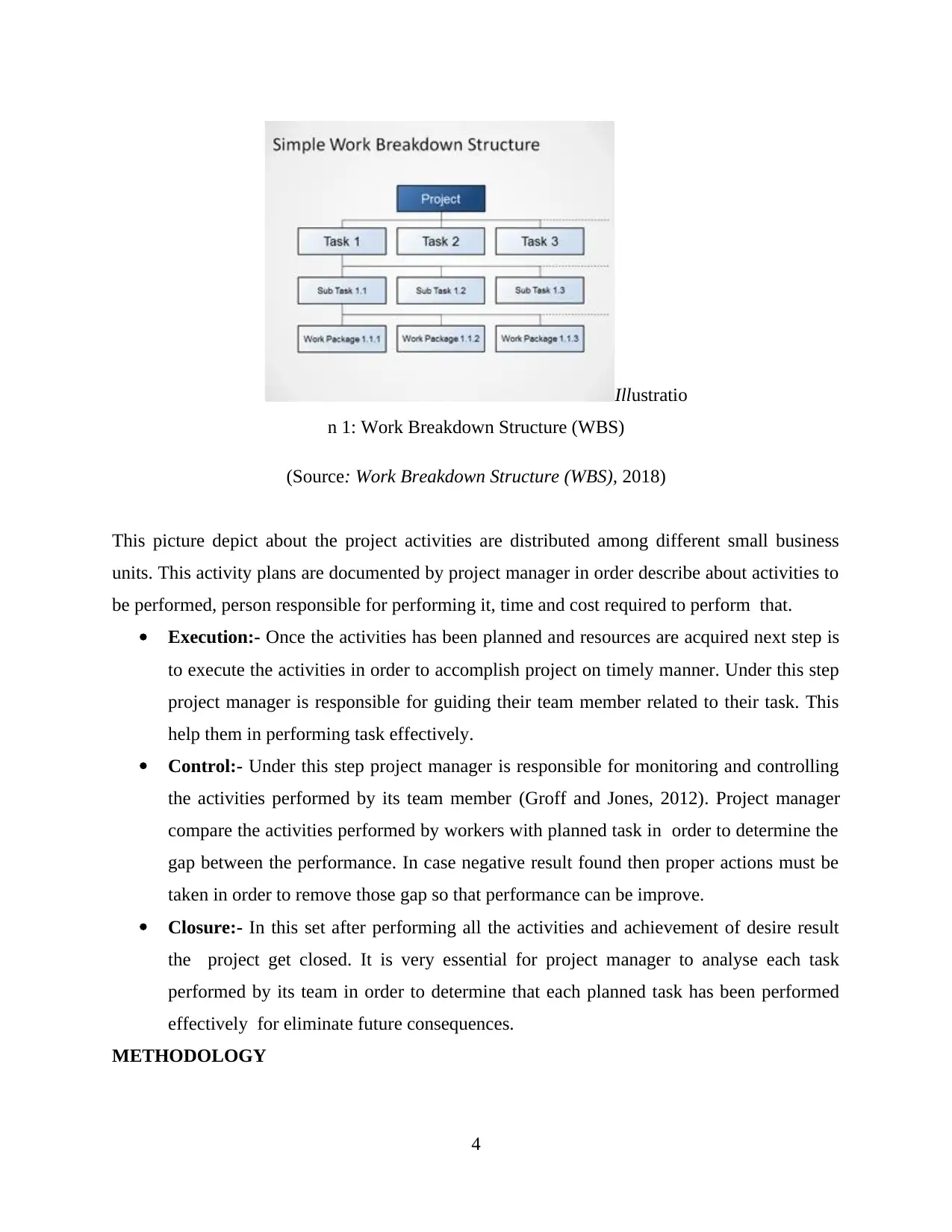
(Source: Work Breakdown Structure (WBS), 2018)
This picture depict about the project activities are distributed among different small business
units. This activity plans are documented by project manager in order describe about activities to
be performed, person responsible for performing it, time and cost required to perform that.
Execution:- Once the activities has been planned and resources are acquired next step is
to execute the activities in order to accomplish project on timely manner. Under this step
project manager is responsible for guiding their team member related to their task. This
help them in performing task effectively.
Control:- Under this step project manager is responsible for monitoring and controlling
the activities performed by its team member (Groff and Jones, 2012). Project manager
compare the activities performed by workers with planned task in order to determine the
gap between the performance. In case negative result found then proper actions must be
taken in order to remove those gap so that performance can be improve.
Closure:- In this set after performing all the activities and achievement of desire result
the project get closed. It is very essential for project manager to analyse each task
performed by its team in order to determine that each planned task has been performed
effectively for eliminate future consequences.
METHODOLOGY
4
Illustratio
n 1: Work Breakdown Structure (WBS)
This picture depict about the project activities are distributed among different small business
units. This activity plans are documented by project manager in order describe about activities to
be performed, person responsible for performing it, time and cost required to perform that.
Execution:- Once the activities has been planned and resources are acquired next step is
to execute the activities in order to accomplish project on timely manner. Under this step
project manager is responsible for guiding their team member related to their task. This
help them in performing task effectively.
Control:- Under this step project manager is responsible for monitoring and controlling
the activities performed by its team member (Groff and Jones, 2012). Project manager
compare the activities performed by workers with planned task in order to determine the
gap between the performance. In case negative result found then proper actions must be
taken in order to remove those gap so that performance can be improve.
Closure:- In this set after performing all the activities and achievement of desire result
the project get closed. It is very essential for project manager to analyse each task
performed by its team in order to determine that each planned task has been performed
effectively for eliminate future consequences.
METHODOLOGY
4
Illustratio
n 1: Work Breakdown Structure (WBS)
⊘ This is a preview!⊘
Do you want full access?
Subscribe today to unlock all pages.

Trusted by 1+ million students worldwide
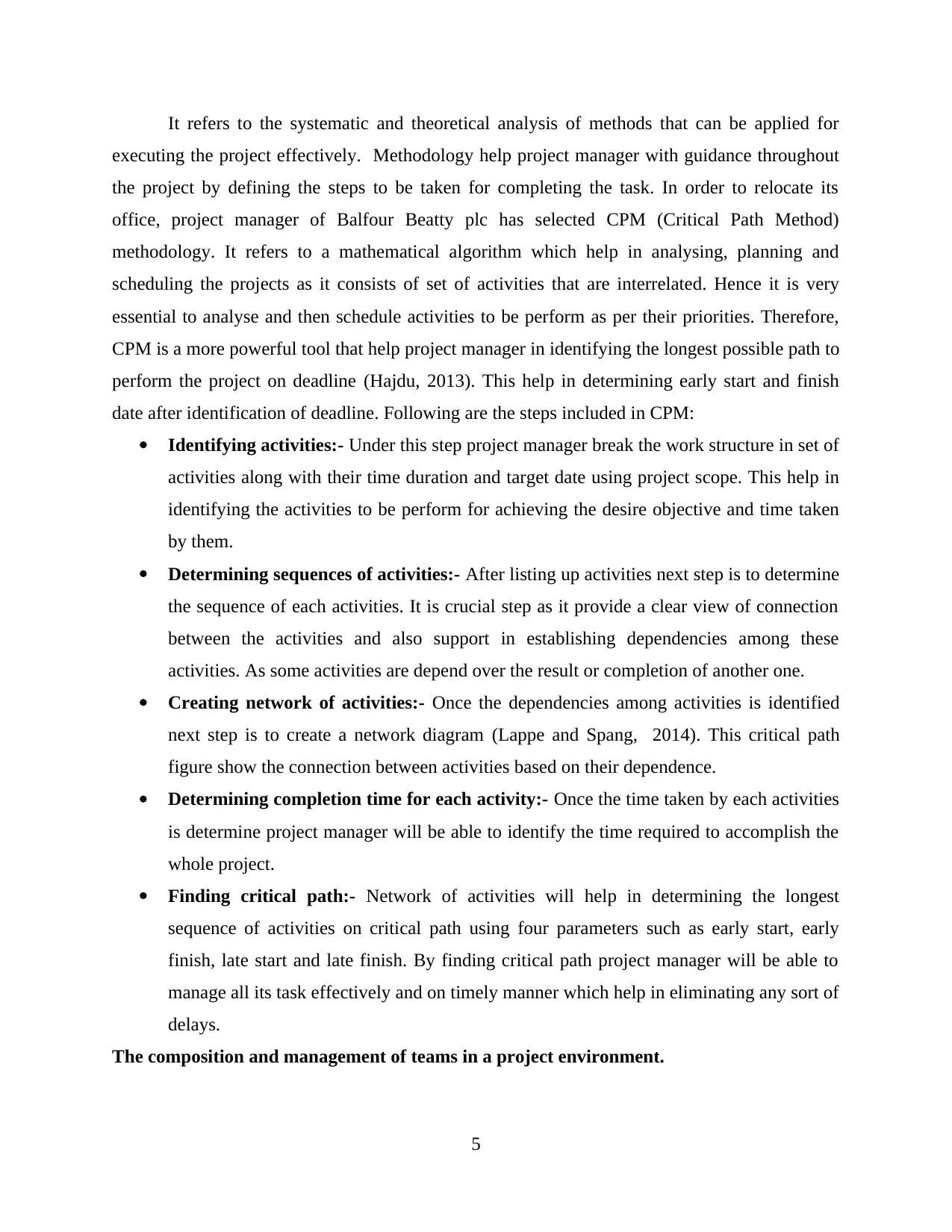
It refers to the systematic and theoretical analysis of methods that can be applied for
executing the project effectively. Methodology help project manager with guidance throughout
the project by defining the steps to be taken for completing the task. In order to relocate its
office, project manager of Balfour Beatty plc has selected CPM (Critical Path Method)
methodology. It refers to a mathematical algorithm which help in analysing, planning and
scheduling the projects as it consists of set of activities that are interrelated. Hence it is very
essential to analyse and then schedule activities to be perform as per their priorities. Therefore,
CPM is a more powerful tool that help project manager in identifying the longest possible path to
perform the project on deadline (Hajdu, 2013). This help in determining early start and finish
date after identification of deadline. Following are the steps included in CPM:
Identifying activities:- Under this step project manager break the work structure in set of
activities along with their time duration and target date using project scope. This help in
identifying the activities to be perform for achieving the desire objective and time taken
by them.
Determining sequences of activities:- After listing up activities next step is to determine
the sequence of each activities. It is crucial step as it provide a clear view of connection
between the activities and also support in establishing dependencies among these
activities. As some activities are depend over the result or completion of another one.
Creating network of activities:- Once the dependencies among activities is identified
next step is to create a network diagram (Lappe and Spang, 2014). This critical path
figure show the connection between activities based on their dependence.
Determining completion time for each activity:- Once the time taken by each activities
is determine project manager will be able to identify the time required to accomplish the
whole project.
Finding critical path:- Network of activities will help in determining the longest
sequence of activities on critical path using four parameters such as early start, early
finish, late start and late finish. By finding critical path project manager will be able to
manage all its task effectively and on timely manner which help in eliminating any sort of
delays.
The composition and management of teams in a project environment.
5
executing the project effectively. Methodology help project manager with guidance throughout
the project by defining the steps to be taken for completing the task. In order to relocate its
office, project manager of Balfour Beatty plc has selected CPM (Critical Path Method)
methodology. It refers to a mathematical algorithm which help in analysing, planning and
scheduling the projects as it consists of set of activities that are interrelated. Hence it is very
essential to analyse and then schedule activities to be perform as per their priorities. Therefore,
CPM is a more powerful tool that help project manager in identifying the longest possible path to
perform the project on deadline (Hajdu, 2013). This help in determining early start and finish
date after identification of deadline. Following are the steps included in CPM:
Identifying activities:- Under this step project manager break the work structure in set of
activities along with their time duration and target date using project scope. This help in
identifying the activities to be perform for achieving the desire objective and time taken
by them.
Determining sequences of activities:- After listing up activities next step is to determine
the sequence of each activities. It is crucial step as it provide a clear view of connection
between the activities and also support in establishing dependencies among these
activities. As some activities are depend over the result or completion of another one.
Creating network of activities:- Once the dependencies among activities is identified
next step is to create a network diagram (Lappe and Spang, 2014). This critical path
figure show the connection between activities based on their dependence.
Determining completion time for each activity:- Once the time taken by each activities
is determine project manager will be able to identify the time required to accomplish the
whole project.
Finding critical path:- Network of activities will help in determining the longest
sequence of activities on critical path using four parameters such as early start, early
finish, late start and late finish. By finding critical path project manager will be able to
manage all its task effectively and on timely manner which help in eliminating any sort of
delays.
The composition and management of teams in a project environment.
5
Paraphrase This Document
Need a fresh take? Get an instant paraphrase of this document with our AI Paraphraser
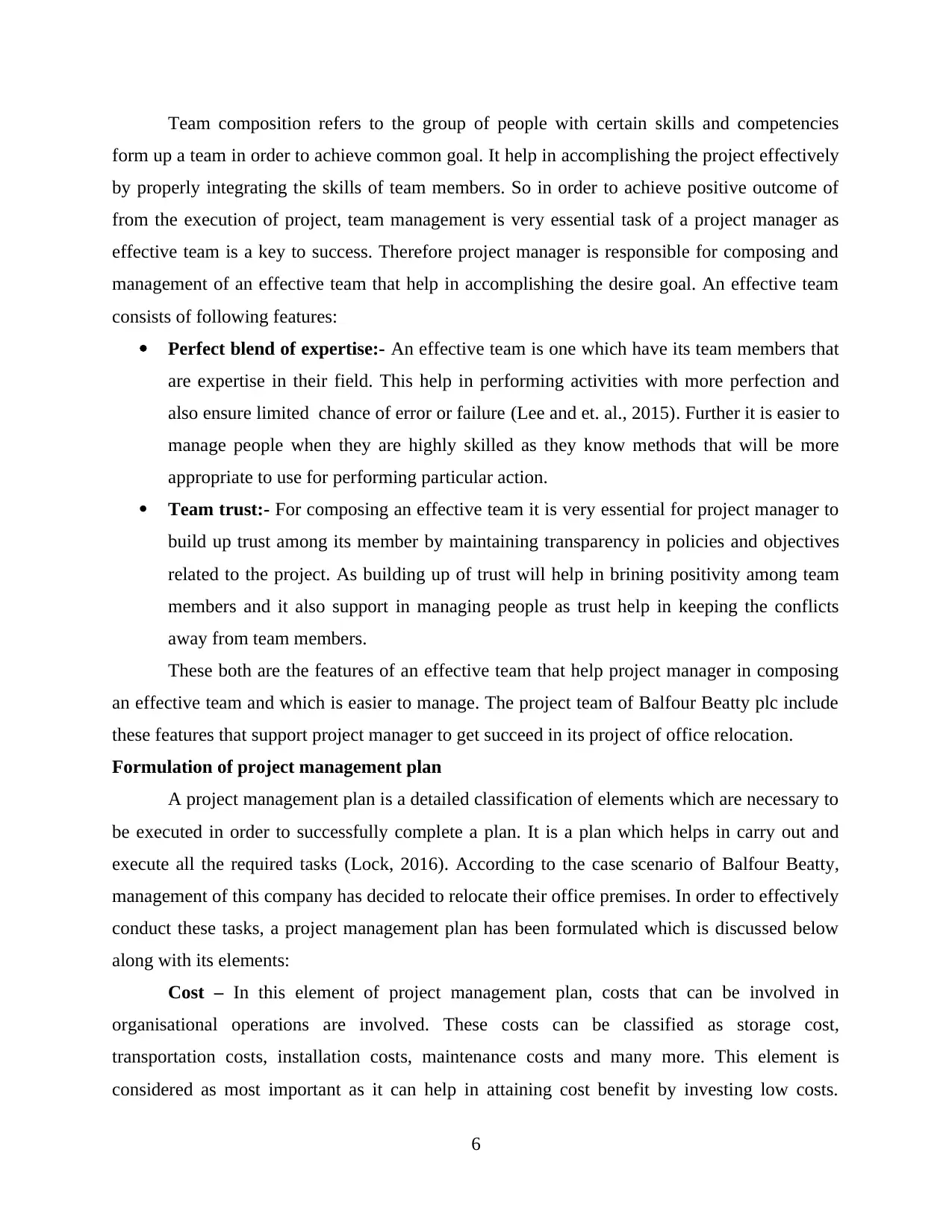
Team composition refers to the group of people with certain skills and competencies
form up a team in order to achieve common goal. It help in accomplishing the project effectively
by properly integrating the skills of team members. So in order to achieve positive outcome of
from the execution of project, team management is very essential task of a project manager as
effective team is a key to success. Therefore project manager is responsible for composing and
management of an effective team that help in accomplishing the desire goal. An effective team
consists of following features:
Perfect blend of expertise:- An effective team is one which have its team members that
are expertise in their field. This help in performing activities with more perfection and
also ensure limited chance of error or failure (Lee and et. al., 2015). Further it is easier to
manage people when they are highly skilled as they know methods that will be more
appropriate to use for performing particular action.
Team trust:- For composing an effective team it is very essential for project manager to
build up trust among its member by maintaining transparency in policies and objectives
related to the project. As building up of trust will help in brining positivity among team
members and it also support in managing people as trust help in keeping the conflicts
away from team members.
These both are the features of an effective team that help project manager in composing
an effective team and which is easier to manage. The project team of Balfour Beatty plc include
these features that support project manager to get succeed in its project of office relocation.
Formulation of project management plan
A project management plan is a detailed classification of elements which are necessary to
be executed in order to successfully complete a plan. It is a plan which helps in carry out and
execute all the required tasks (Lock, 2016). According to the case scenario of Balfour Beatty,
management of this company has decided to relocate their office premises. In order to effectively
conduct these tasks, a project management plan has been formulated which is discussed below
along with its elements:
Cost – In this element of project management plan, costs that can be involved in
organisational operations are involved. These costs can be classified as storage cost,
transportation costs, installation costs, maintenance costs and many more. This element is
considered as most important as it can help in attaining cost benefit by investing low costs.
6
form up a team in order to achieve common goal. It help in accomplishing the project effectively
by properly integrating the skills of team members. So in order to achieve positive outcome of
from the execution of project, team management is very essential task of a project manager as
effective team is a key to success. Therefore project manager is responsible for composing and
management of an effective team that help in accomplishing the desire goal. An effective team
consists of following features:
Perfect blend of expertise:- An effective team is one which have its team members that
are expertise in their field. This help in performing activities with more perfection and
also ensure limited chance of error or failure (Lee and et. al., 2015). Further it is easier to
manage people when they are highly skilled as they know methods that will be more
appropriate to use for performing particular action.
Team trust:- For composing an effective team it is very essential for project manager to
build up trust among its member by maintaining transparency in policies and objectives
related to the project. As building up of trust will help in brining positivity among team
members and it also support in managing people as trust help in keeping the conflicts
away from team members.
These both are the features of an effective team that help project manager in composing
an effective team and which is easier to manage. The project team of Balfour Beatty plc include
these features that support project manager to get succeed in its project of office relocation.
Formulation of project management plan
A project management plan is a detailed classification of elements which are necessary to
be executed in order to successfully complete a plan. It is a plan which helps in carry out and
execute all the required tasks (Lock, 2016). According to the case scenario of Balfour Beatty,
management of this company has decided to relocate their office premises. In order to effectively
conduct these tasks, a project management plan has been formulated which is discussed below
along with its elements:
Cost – In this element of project management plan, costs that can be involved in
organisational operations are involved. These costs can be classified as storage cost,
transportation costs, installation costs, maintenance costs and many more. This element is
considered as most important as it can help in attaining cost benefit by investing low costs.
6
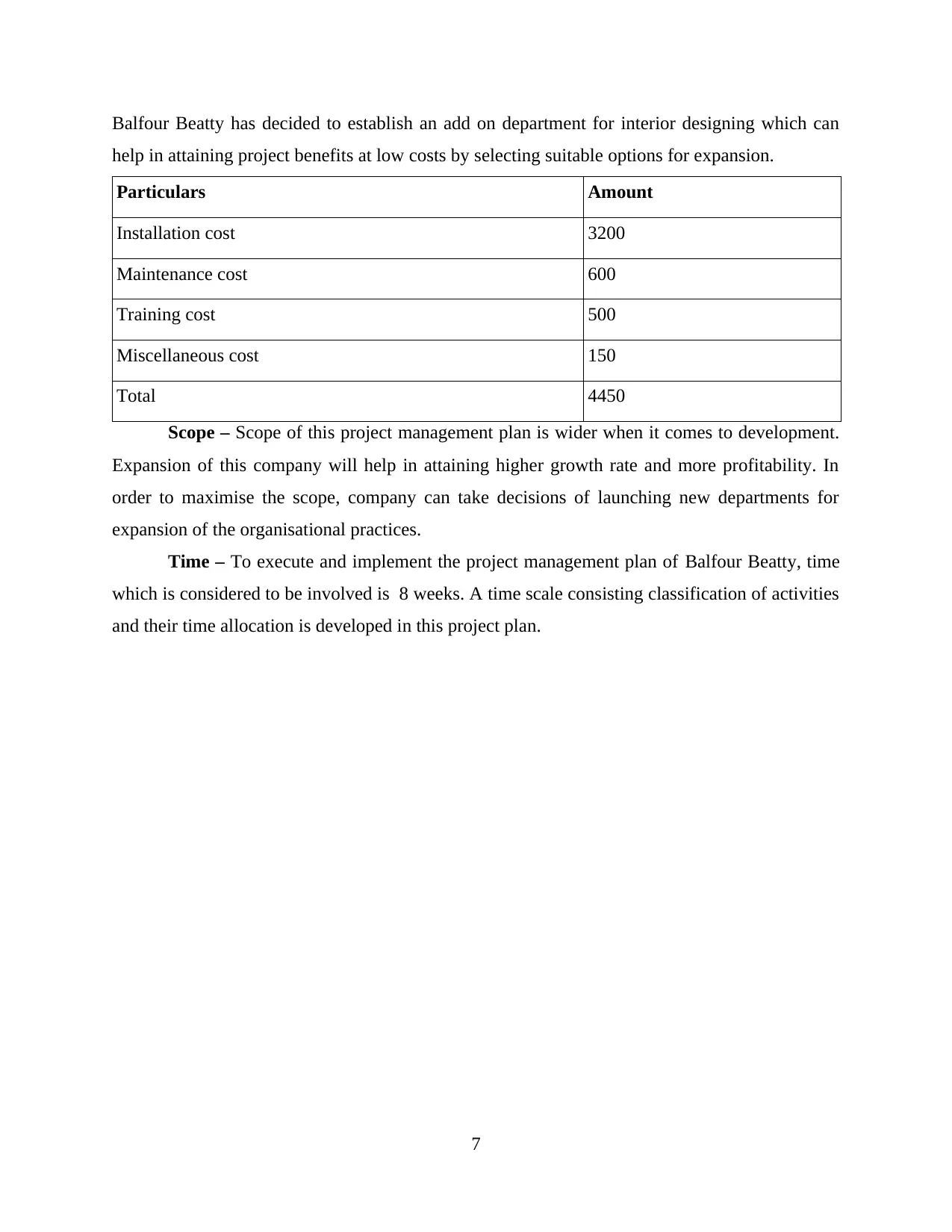
Balfour Beatty has decided to establish an add on department for interior designing which can
help in attaining project benefits at low costs by selecting suitable options for expansion.
Particulars Amount
Installation cost 3200
Maintenance cost 600
Training cost 500
Miscellaneous cost 150
Total 4450
Scope – Scope of this project management plan is wider when it comes to development.
Expansion of this company will help in attaining higher growth rate and more profitability. In
order to maximise the scope, company can take decisions of launching new departments for
expansion of the organisational practices.
Time – To execute and implement the project management plan of Balfour Beatty, time
which is considered to be involved is 8 weeks. A time scale consisting classification of activities
and their time allocation is developed in this project plan.
7
help in attaining project benefits at low costs by selecting suitable options for expansion.
Particulars Amount
Installation cost 3200
Maintenance cost 600
Training cost 500
Miscellaneous cost 150
Total 4450
Scope – Scope of this project management plan is wider when it comes to development.
Expansion of this company will help in attaining higher growth rate and more profitability. In
order to maximise the scope, company can take decisions of launching new departments for
expansion of the organisational practices.
Time – To execute and implement the project management plan of Balfour Beatty, time
which is considered to be involved is 8 weeks. A time scale consisting classification of activities
and their time allocation is developed in this project plan.
7
⊘ This is a preview!⊘
Do you want full access?
Subscribe today to unlock all pages.

Trusted by 1+ million students worldwide
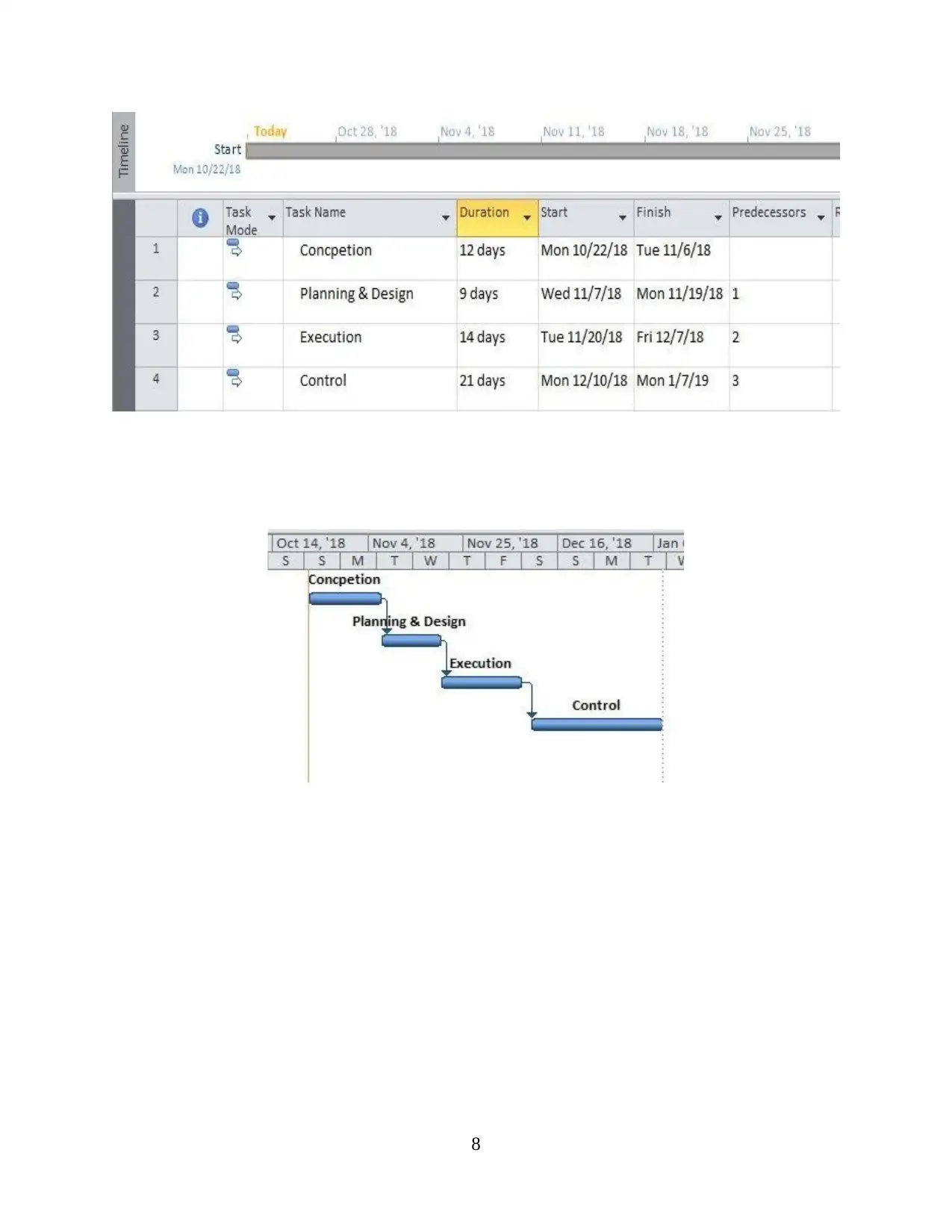
8
Paraphrase This Document
Need a fresh take? Get an instant paraphrase of this document with our AI Paraphraser
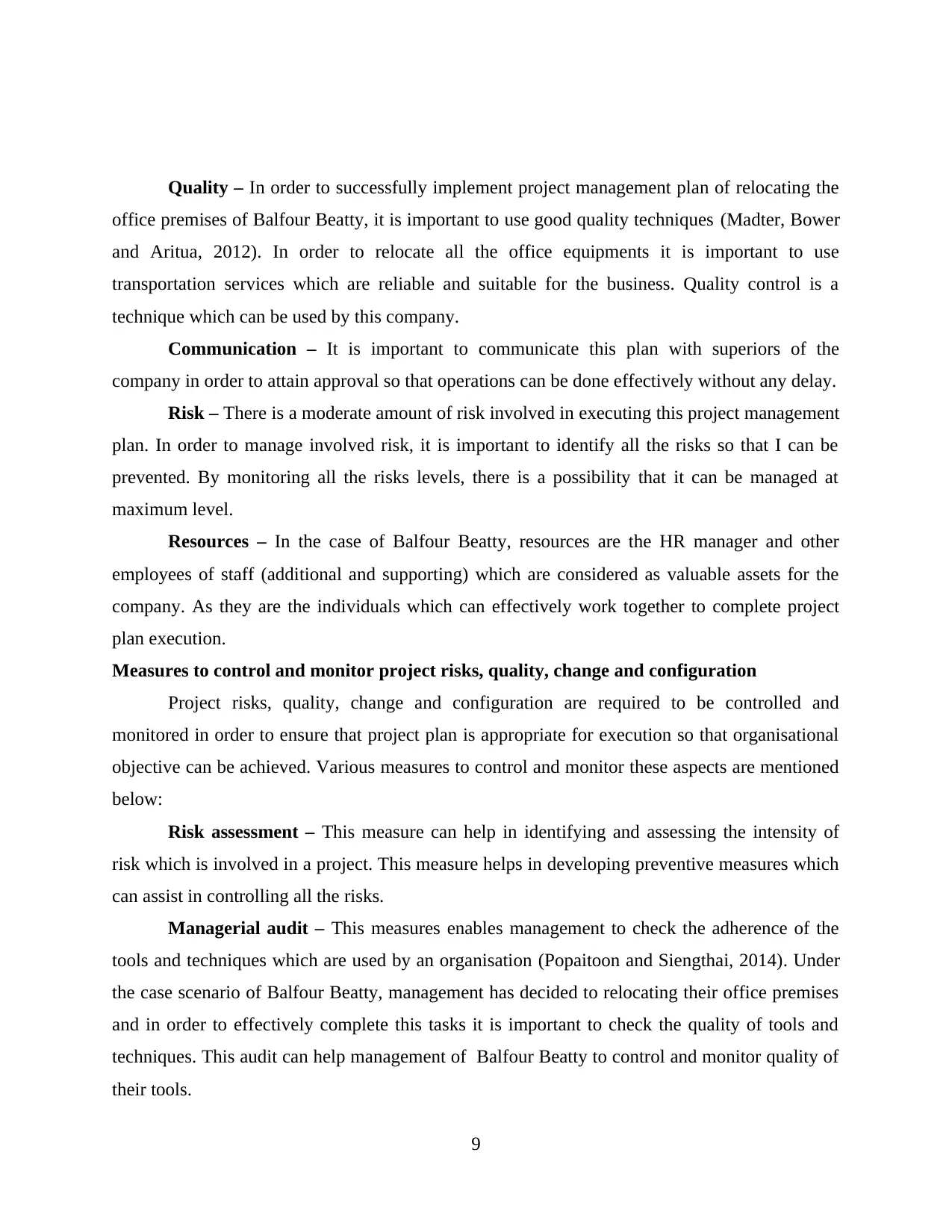
Quality – In order to successfully implement project management plan of relocating the
office premises of Balfour Beatty, it is important to use good quality techniques (Madter, Bower
and Aritua, 2012). In order to relocate all the office equipments it is important to use
transportation services which are reliable and suitable for the business. Quality control is a
technique which can be used by this company.
Communication – It is important to communicate this plan with superiors of the
company in order to attain approval so that operations can be done effectively without any delay.
Risk – There is a moderate amount of risk involved in executing this project management
plan. In order to manage involved risk, it is important to identify all the risks so that I can be
prevented. By monitoring all the risks levels, there is a possibility that it can be managed at
maximum level.
Resources – In the case of Balfour Beatty, resources are the HR manager and other
employees of staff (additional and supporting) which are considered as valuable assets for the
company. As they are the individuals which can effectively work together to complete project
plan execution.
Measures to control and monitor project risks, quality, change and configuration
Project risks, quality, change and configuration are required to be controlled and
monitored in order to ensure that project plan is appropriate for execution so that organisational
objective can be achieved. Various measures to control and monitor these aspects are mentioned
below:
Risk assessment – This measure can help in identifying and assessing the intensity of
risk which is involved in a project. This measure helps in developing preventive measures which
can assist in controlling all the risks.
Managerial audit – This measures enables management to check the adherence of the
tools and techniques which are used by an organisation (Popaitoon and Siengthai, 2014). Under
the case scenario of Balfour Beatty, management has decided to relocating their office premises
and in order to effectively complete this tasks it is important to check the quality of tools and
techniques. This audit can help management of Balfour Beatty to control and monitor quality of
their tools.
9
office premises of Balfour Beatty, it is important to use good quality techniques (Madter, Bower
and Aritua, 2012). In order to relocate all the office equipments it is important to use
transportation services which are reliable and suitable for the business. Quality control is a
technique which can be used by this company.
Communication – It is important to communicate this plan with superiors of the
company in order to attain approval so that operations can be done effectively without any delay.
Risk – There is a moderate amount of risk involved in executing this project management
plan. In order to manage involved risk, it is important to identify all the risks so that I can be
prevented. By monitoring all the risks levels, there is a possibility that it can be managed at
maximum level.
Resources – In the case of Balfour Beatty, resources are the HR manager and other
employees of staff (additional and supporting) which are considered as valuable assets for the
company. As they are the individuals which can effectively work together to complete project
plan execution.
Measures to control and monitor project risks, quality, change and configuration
Project risks, quality, change and configuration are required to be controlled and
monitored in order to ensure that project plan is appropriate for execution so that organisational
objective can be achieved. Various measures to control and monitor these aspects are mentioned
below:
Risk assessment – This measure can help in identifying and assessing the intensity of
risk which is involved in a project. This measure helps in developing preventive measures which
can assist in controlling all the risks.
Managerial audit – This measures enables management to check the adherence of the
tools and techniques which are used by an organisation (Popaitoon and Siengthai, 2014). Under
the case scenario of Balfour Beatty, management has decided to relocating their office premises
and in order to effectively complete this tasks it is important to check the quality of tools and
techniques. This audit can help management of Balfour Beatty to control and monitor quality of
their tools.
9
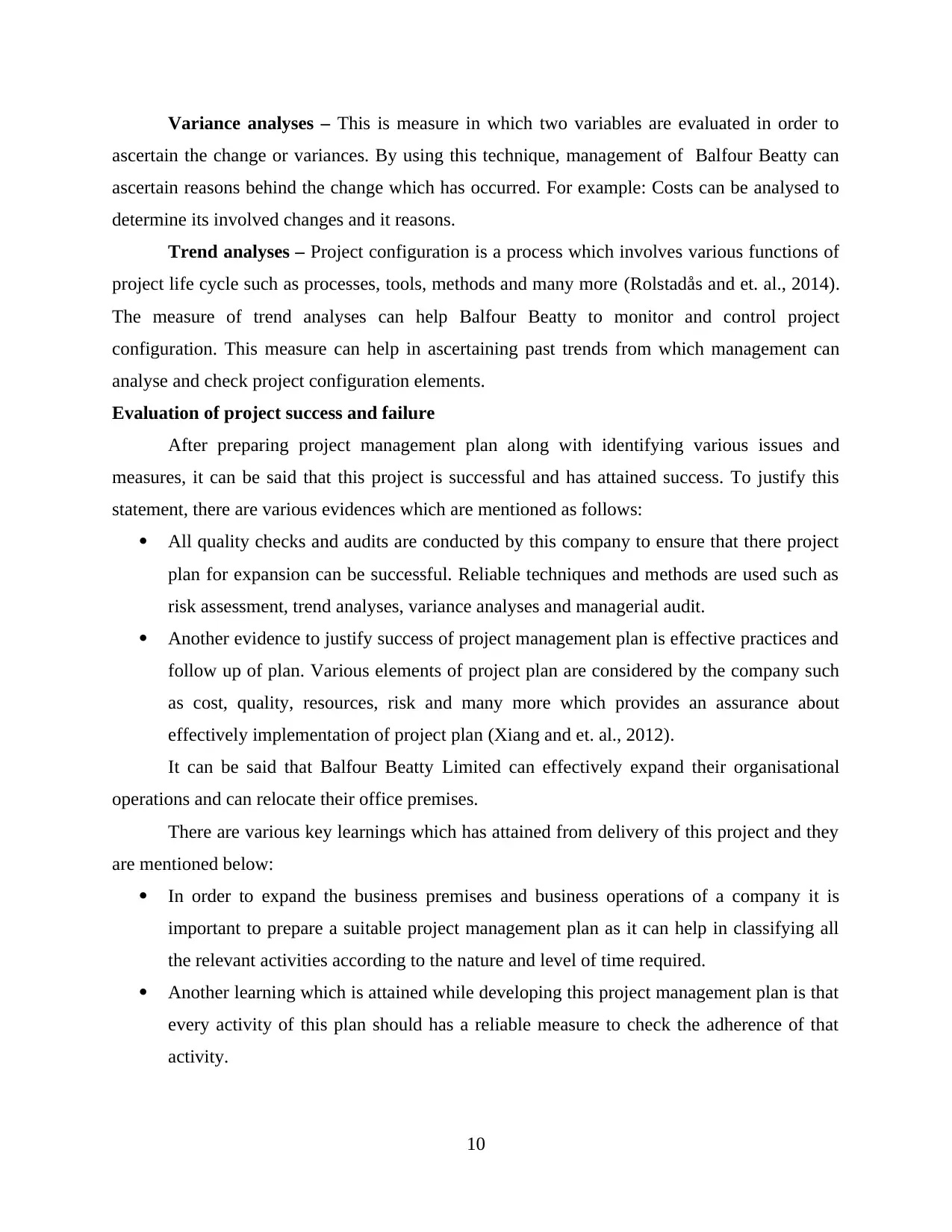
Variance analyses – This is measure in which two variables are evaluated in order to
ascertain the change or variances. By using this technique, management of Balfour Beatty can
ascertain reasons behind the change which has occurred. For example: Costs can be analysed to
determine its involved changes and it reasons.
Trend analyses – Project configuration is a process which involves various functions of
project life cycle such as processes, tools, methods and many more (Rolstadås and et. al., 2014).
The measure of trend analyses can help Balfour Beatty to monitor and control project
configuration. This measure can help in ascertaining past trends from which management can
analyse and check project configuration elements.
Evaluation of project success and failure
After preparing project management plan along with identifying various issues and
measures, it can be said that this project is successful and has attained success. To justify this
statement, there are various evidences which are mentioned as follows:
All quality checks and audits are conducted by this company to ensure that there project
plan for expansion can be successful. Reliable techniques and methods are used such as
risk assessment, trend analyses, variance analyses and managerial audit.
Another evidence to justify success of project management plan is effective practices and
follow up of plan. Various elements of project plan are considered by the company such
as cost, quality, resources, risk and many more which provides an assurance about
effectively implementation of project plan (Xiang and et. al., 2012).
It can be said that Balfour Beatty Limited can effectively expand their organisational
operations and can relocate their office premises.
There are various key learnings which has attained from delivery of this project and they
are mentioned below:
In order to expand the business premises and business operations of a company it is
important to prepare a suitable project management plan as it can help in classifying all
the relevant activities according to the nature and level of time required.
Another learning which is attained while developing this project management plan is that
every activity of this plan should has a reliable measure to check the adherence of that
activity.
10
ascertain the change or variances. By using this technique, management of Balfour Beatty can
ascertain reasons behind the change which has occurred. For example: Costs can be analysed to
determine its involved changes and it reasons.
Trend analyses – Project configuration is a process which involves various functions of
project life cycle such as processes, tools, methods and many more (Rolstadås and et. al., 2014).
The measure of trend analyses can help Balfour Beatty to monitor and control project
configuration. This measure can help in ascertaining past trends from which management can
analyse and check project configuration elements.
Evaluation of project success and failure
After preparing project management plan along with identifying various issues and
measures, it can be said that this project is successful and has attained success. To justify this
statement, there are various evidences which are mentioned as follows:
All quality checks and audits are conducted by this company to ensure that there project
plan for expansion can be successful. Reliable techniques and methods are used such as
risk assessment, trend analyses, variance analyses and managerial audit.
Another evidence to justify success of project management plan is effective practices and
follow up of plan. Various elements of project plan are considered by the company such
as cost, quality, resources, risk and many more which provides an assurance about
effectively implementation of project plan (Xiang and et. al., 2012).
It can be said that Balfour Beatty Limited can effectively expand their organisational
operations and can relocate their office premises.
There are various key learnings which has attained from delivery of this project and they
are mentioned below:
In order to expand the business premises and business operations of a company it is
important to prepare a suitable project management plan as it can help in classifying all
the relevant activities according to the nature and level of time required.
Another learning which is attained while developing this project management plan is that
every activity of this plan should has a reliable measure to check the adherence of that
activity.
10
⊘ This is a preview!⊘
Do you want full access?
Subscribe today to unlock all pages.

Trusted by 1+ million students worldwide
1 out of 14
Related Documents
Your All-in-One AI-Powered Toolkit for Academic Success.
+13062052269
info@desklib.com
Available 24*7 on WhatsApp / Email
![[object Object]](/_next/static/media/star-bottom.7253800d.svg)
Unlock your academic potential
Copyright © 2020–2025 A2Z Services. All Rights Reserved. Developed and managed by ZUCOL.





